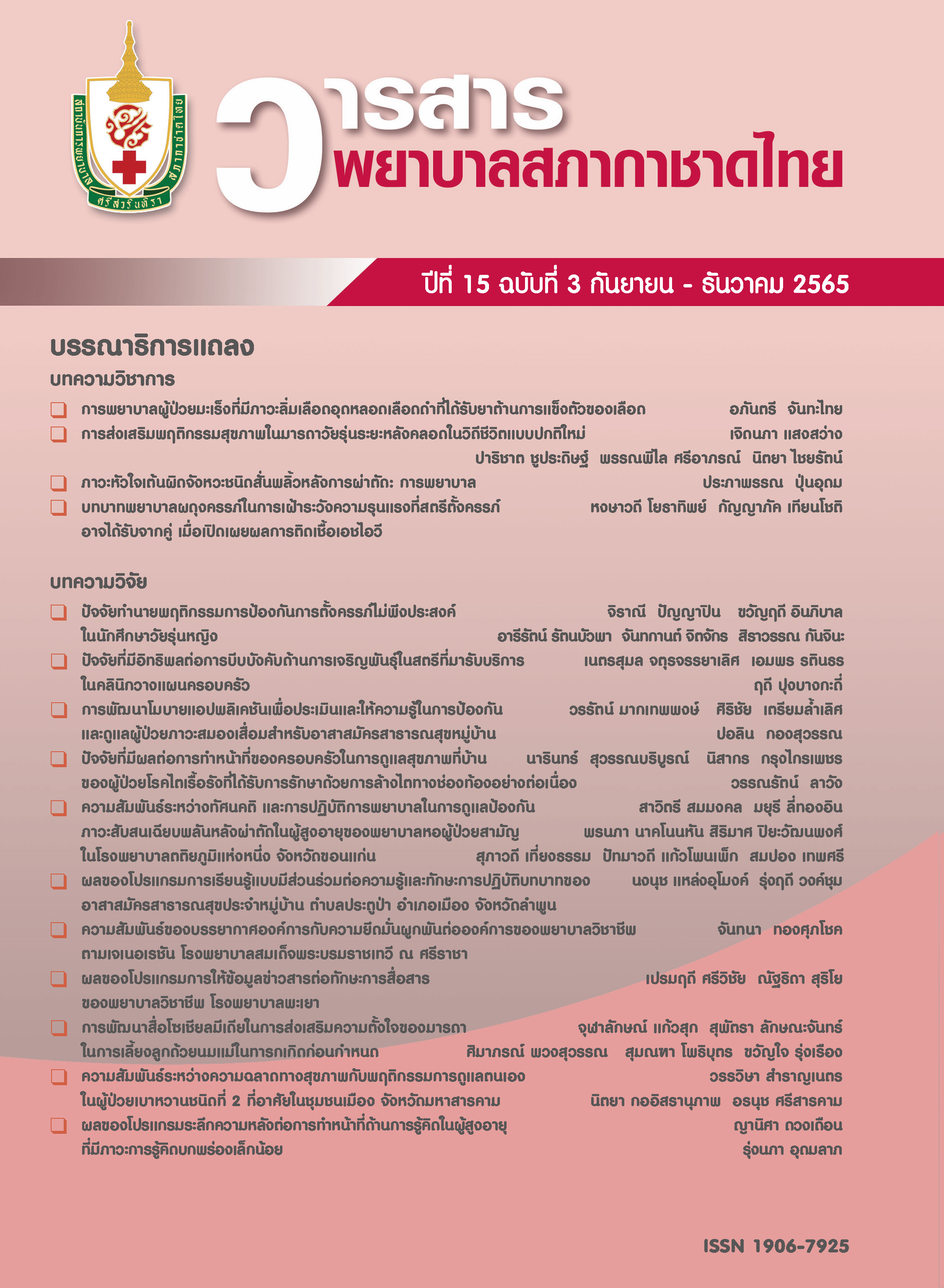The Relationship between Organizational Climate and Organizational Commitment Among Nurses from Different Generations at Queen Savang Vadhana Memorial Hospital
Keywords:
organizational climate, organizational commitment, generationAbstract
The objectives of this study were to study 1) the levels of organizational climate and organizational commitment among the different generations of nurses, and 2) the relationship between organizational climate and organizational commitment among the different generations of nurses. The sample consisted of 226 registered nurses who were randomly selected through four levels of stratified random sampling among each generation, grouped into four generations: the baby boomers, generation X, generation Y, and generation Z, using a questionnaire; the reliability of the questionnaires using Cronbach’s Alpha Coefficient were found to be .88 and .81 for organizational climate and organizational commitment, respectively. Data were collected and analyzed to determine the mean, standard deviation, Pearson’s product-moment correlation coefficient, and Spearman’s rank correlation coefficient.
The results showed that 1) the organizational climate of nurses was at a high level ( = 3.76, SD = .41); Generation X had the greatest mean score of organizational climate (
= 3.81, SD = .46), followed by Generation Y (
= 3.73, SD = .38) and Generation Z (
= 3.72, SD = .45); 2) the organizational commitment of nurses was at a moderate level (
= 3.11, SD = .27); Generation X had the greatest mean score of organizational commitment (
= 3.13, SD = .24), followed by Generation Y (
= 3.11, SD = .29), and Generation Z (
= 3.07, SD = .32); and 3) the relationship between organizational climate and the commitment of nurses was significantly positively correlated (rs = .440, p < .001). The baby boomer generation showed the highest correlation (rs = .776, p < .05), followed by Generation Z (r = .579, p < .01) and Generation Y (rs = .419, p < .001).
These results can be applied when planning to improve the organizational climate and strengthen the organizational commitment for each generation of nurses to meet the required standards.
References
Kerdsang P. Organizational commitment of professional nurses in Nakhon Pathom Hospital [Thesis]. Bangkok: Krirk University; 2019. (in Thai)
Allen NJ, Meyer JP. Organizational Socialization tactics: a longitudinal analysis of links to newcomers’ commitment and role orientation. Acad Manag J 1990;33:847-58.
Ounpol P, Sriruecha C. Personal characteristics and organizational climate affecting influencing of professional nurse in somewhere center hospital in the northeast. Research and Development Health System Journal 2021;14(1):450-7. (in Thai)
Boonsanan S. The commitment of professional nurses to the organization Pak Tho Hospital. Journal of Research for Health Improvement and Quality of Life 2022;2(1): 51-61. (in Thai)
Kittiworavej S, Wongwai N. Organization commitment of instructor of faculty of nursing. Ubon Ratchathani University. J SocHu UBU 2021;12(1):161-79. (in Thai)
Stringer RA. Leadership and organizational climate: the cloud chamber effect. Upper Saddle River, New Jersey: Prentice Hall; 2002.
Boonyakiat T. The perception of organization climate influenced work commitment and organizational citizenship behavior [Thesis]. Pathumthani: Rajamangala University of Technology Thanyaburi; 2016. (in Thai)
Suthiprapa C, Pensirinapa N, Kerapong P. Organization climate and organization commitment of registered nurses in a chain of private hospitals. Thai Journal of Nurs-ing 2018;67(4):25-33. (in Thai)
Brown WB. Morberg DJ. Organization theory and management: a macro approach. New York: John Wiley and Sons; 1980.
Ferry KN. Building up organizational commitment of generation Z. FEU Academic Review 2019;13(3):10-25. (in Thai)
Srinont M. Theory of generation and cognitive framework. MBU Education Journal 2018;6(1):364-73. (in Thai)
Queen Savang Vadhana Memorial Hospital. Strategic plan of Queen Savang Vadhana Memorial Hospital 2021-2024. Chonburi: Queen Savang Vadhana Memorial Hospital; 2021. (in Thai)
Human Resources Department. Report the results of the survey of well-being and commitment 2020-2021. Chonburi: Queen Savang Vadhana Memorial Hospital; 2021. (in Thai)
Nursing Department. Personal satisfaction survey report. Chonburi: Queen Savang Vadhana Memorial Hospital; 2021. (in Thai)
Srisatidnarakul B. The methodology in nursing research. 4th ed. Bangkok: U & I Inter MEDIA; 2007. (in Thai)
Kusol W. Factors influencing organizational commitment of registration nurses at a private hospital in Bangkok metropolitan [Thesis]. Bangkok: Christian University of Thailand; 2016. (in Thai)
Anglee W. Organizational climate of community hospitals as perceived by profession nurses in Sakon Nakhon province [Thesis]. Sakon Nakhon: Burapa University; 2015. (in Thai)
Karakate P, Supamanee T, Chitpakdee. Factors predicting organizational citizenship behaviors among generation Y nurses, Government University Hospitals. Nursing Journal 2020;47(2):356-68. (in Thai)
Taiwong A, Chitpakdee B. Generation Z registered nurses of the health system in Thailand, challenging management strategies for nursing administrators. Royal Thai Navy Medical Journal 2021;48(1):199-209. (in Thai)
Pimonratnakan S, Jadesadalug V. The influence of the perception organizational climate through job satisfaction and organization commitment in-role performance. Veridian E-Journal, Silpakorn University 2017;10(2):1611-29. (in Thai)
Boondang C, Kaewpan W, Kalampakorn S, Seenboot J. Factor Relating to job retention of generation Y registered nurses at community hospitals in health region 4. Nursing Journal of the Ministry of Public Health 2022;32(1):168-81. (in Thai)
Downloads
Published
Issue
Section
License
Copyright (c) 2023 Srisavarindhira Thai Red Cross Institute of Nursing

This work is licensed under a Creative Commons Attribution-NonCommercial-NoDerivatives 4.0 International License.
เนื้อหาบทความหรือข้อคิดเห็นต่างๆ ในวารสารพยาบาลสภากาชาดไทยนี้ เป็นความคิดเห็นของผู้เขียนบทความ ไม่ใช่ความเห็นของกองบรรณาธิการ หรือสถาบันการพยาบาลศรีสวรินทิรา สภากาชาดไทย






